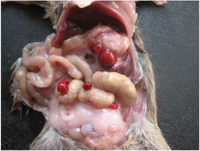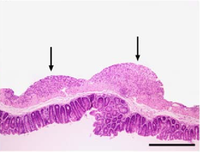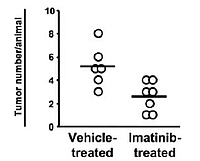Animal model for Gastrointestinal Stromal Tumor (GIST)
Gastrointestinal stromal tumor (GIST) is one of the most common mesenchymal tumors of the gastrointestinal tract. GISTs occur in 10-20 per one million people. Thus, GIST has been named as an orphan drug disease. Scientists at the University of Göttingen developed a new animal drug screening model for GIST, which is caused by dysfunction of the Hedgehog pathway.
Challenge
Typically, GIST formation is driven by mutations in the KIT/CD117 gene. However, not all tumors are driven by those mutations. Hence, there is a need for animal models reflecting this situation.
Our Solution
Scientists at the University of Göttingen developed a new animal drug screening model for GIST, which is caused by dysfunction of the Hedgehog pathway. This is the first immunological GIST mouse model with an aberrant Hedgehog signaling independent of Kit, demonstrating the importance of this particular pathway in GIST formation.
 Gross appearance of tumors of KO mice. Source: P. Pelczar.
Gross appearance of tumors of KO mice. Source: P. Pelczar.
Advantages
- Novel GIST animal model caused by aberrant Hedgehog pathway independent of KIT mutations.
- Conditional gene knock-out of a key player within Hedgehog pathway in monocytes (LysM-positive cells).
- Severe gastrointestinal phenotype without affecting otherwise normal development.
- Good and effective breeding.

Tumors of this novel mouse model have a GIST-like histology. Source: W.J. Schulz-Schaeffer.
Applications
- Excellent drug screening model for new targets within Hedgehog signaling.
- Efficacy testing of potential new therapeutics for GIST.
Developmental Status
- Fully characterized new mouse model for GIST.
- Proof of concept with Imatinib treatment.
Tumors of GIST-mice are responsive to Imatinib, which is used in the treatment of human GIST. Source: P. Pelczar.
Patent Status
No IPR. We are selling/licensing this mouse model.
References
Pelczar et al.: Inactivation of Patched1 in Mice Leads to Development of Gastrointestinal Stromal-Like Tumors that Express Pdgfr alpha but not Kit. Gastroenterology, 2013, 144:134 –144.
Contact
Dr. Stefan Uhle
Patent Manager Life Science
E-Mail: This email address is being protected from spambots. You need JavaScript enabled to view it.
Tel.: +49 551 30724 154
Reference: BioC-1466-UMG
Tags: Animal models, Life science

